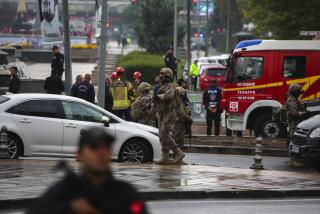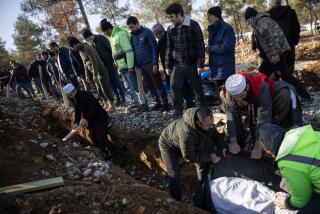Ocalan’s Dueling Images: Terrorist and Liberator
- Share via
ANKARA, Turkey — During his furtive zigzagging across Europe and Africa recently, Kurdish rebel leader Abdullah Ocalan railed about the “injustice” that he was desperate to avoid--capture and trial by the Turks.
Yes, his guerrillas had killed soldiers and unarmed civilians, he admitted, but blaming only him would obscure the causes of the struggle for Kurdish self-rule. “By accusing me, they’re trying to cover up crimes of the state,” Ocalan said in a December interview in Rome. “If there’s going to be a trial, the whole war must be investigated.”
In fact, both sides in Turkey’s bitter ethnic conflict have staged kidnappings, summary executions, assaults on villages and other breaches of international humanitarian law, according to Turkish, Kurdish and foreign human rights monitors.
Yet it’s the winners who put the losers on trial. Nabbed in Kenya and flown to Turkey a week ago, Ocalan was formally arrested Tuesday and charged with treason. Prosecutors said they will seek the death penalty.
Ocalan’s trial, still weeks or months away, could turn into a contest of two images--the terrorist and the liberator.
Turkey appears to have strong cases against the 50-year-old warlord--both the one initiated Tuesday and others, expected to follow, that accuse him of terrorism and killings. Leading a revolt for independence--a goal he scaled back years ago to Kurdish autonomy--is treasonous under Turkish law.
His movement’s methods, such as killing teachers who ignored demands to shut down their schools and attacking unarmed villagers who sided with the Turks, are traceable in specific cases to taped orders by Ocalan himself, Turkish officials say.
By branding Ocalan a terrorist, Turkey, with crucial help from the United States, was able to force him out of his longtime Syrian sanctuary in October and persuade other nations to rebuff his frantic search for asylum.
To gain the upper hand over Ocalan’s insurgency, however, Turkey’s security forces long ago adopted his terrorizing ways and turned them on his unarmed followers, rights monitors report.
And by refusing to allow anyone less brutal to emerge as a legal advocate for Kurdish rights, the Turks have given him legitimacy as a “freedom fighter” among millions of Kurds who never took up arms.
Until his capture, Turkey’s most wanted fugitive was trying to get an international court somewhere in Europe to sit in judgment of both him and the Turkish state so he could publicize the torment of his stateless people.
When his trial opens in Turkey, “he will try, probably,” to argue the Kurdish cause, “but the question is whether he will be able to,” said Britta Boehler, a German lawyer who has worked for Ocalan.
Tuesday’s closed hearing before a state security court judge was held on the prison island of Imrali , where Ocalan has been interrogated for the past week.
He has not been allowed to see an attorney; one of his Turkish lawyers said he was told he could go to the island Tuesday but was later barred. The judge, whose three-member court includes one military officer, is not obliged to hold the trial in public, and the government says it will not admit foreign observers.
Launched with raids from Syria in 1984, Ocalan’s uprising was the latest of many this century to resist Turkish assimilation of the Kurds. Turkey’s 12 million Kurds, who make up one-fifth of the population and live mainly in the impoverished southeast, have no right to teach or broadcast in their language; even calling for such rights can land an activist in jail.
The government has clamped the southeast under emergency rule. The rebels sabotage development projects, viewing them as efforts by the government to tighten its hold on the region. By making teachers their targets--at least 134 have been killed--the rebels try to prevent what they consider the indoctrination of Kurds by a system that denies their ethnic identity.
“Every time we try to build something positive [for the southeast], they would destroy it,” a Turkish official said. “Then the army comes in and makes things worse.”
Villagers in the southeast say the army gives them a brutal choice: either joining a government system of village guards and taking up arms against fellow Kurds, or watching as the army razes their homes. According to reliable estimates, the army has burned nearly 3,000 settlements, bombing many of them from the air. Nearly 2 million inhabitants have been expelled; few have been allowed to return.
The rebels have retaliated by killing guardsmen and their families, alienating entire villages and clans in the southeast. The spiral of violence peaked between 1992 and 1995, when the rebels’ strength began to wane.
Official figures in the Turkish media in November suggest a modest rate of civilian casualties--most of which the government cannot explain. Of the 30,678 war dead, according to these figures, 21,598 were armed rebels, 4,748 government soldiers and 4,332 civilians.
No one making lists, inside or outside the government, has been able to attribute more than 768 of those civilian deaths to the rebels. That figure comes from Human Rights Watch, which has condemned both the government and the rebels for atrocities.
Despite the airing of wartime abuses in parliament, the government has made only scattered, token efforts to prosecute officers held responsible--always at a low rank. It has ruled out peace talks or an easing of emergency restrictions on free expression while Ocalan’s 5,000 or so rebels continue to fight.
“If we have a problem in the southeast, it can be resolved within our institutions,” Hikmet Sami Turk said in an interview in December before becoming defense minister. “We have a parliament, we have local officials in each province, we have municipal councils. We don’t need negotiations.”
Indeed, the southeast is represented in parliament by moderate Kurdish nationalists such as Hasim Hasimi, head of a parliamentary committee on the plight of villagers displaced by the army.
Hasimi is no fan of Ocalan’s rebels, but he places blame for the war squarely on the state.
“The past seven governments, since 1990, have promised the southeast a whole list of economic and social improvements, an end to torture, the right of return to the villages,” he said. “But they’ve done nothing. There’s no trust left in the state, and that’s what keeps the rebellion going.”
Special correspondent Amberin Zaman in Ankara contributed to this report.
More to Read
Sign up for Essential California
The most important California stories and recommendations in your inbox every morning.
You may occasionally receive promotional content from the Los Angeles Times.













